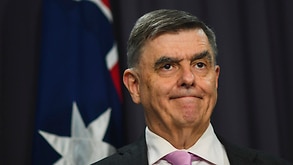Chief Medical Officer Professor Brendan Murphy speaks during a press conference updating on the novel coronavirus at Parliament House in Canberra. Source: AAP
In May 2009 the H1N1 virus, or swine flu, was spreading throughout the world like the coronavirus is today. In reaction to what she considered was her country's poor management of the threat Professor Lee Wei Ling, daughter of Lee Kuan Yew and sister of PM Lee Hsien Loong, wrote a letter that was published in the Strait Times in which she recommended that the strategy of screening be abandoned.
She proposed instead a strategy of herd immunisation:
One possibility suggested by some doctors, including specialists in infectious diseases, is to freely open our borders, allow the relatively benign H1N1 to come into Singapore and allow our people to develop herd immunity. This way, if or when the virus mutates and turns virulent, our herd immunity may better protect us from a serious epidemic.
Australia imposed travel bans on arrivals from China, but only belatedly:
City of Sydney Lunar New Year 2020 Festival became an obvious security risk by mid-Jan if not earlier, but no warning from NSW Emergency Management Committee, Clover Moore and no screening at airports
Then, in what might be described as a case of confusion of function the Chief Medical Officer Brendan Murphy declared that Australian were being racist and xenophobic for linking the coronavirus to anyone who appeared to be from China:
Chief Medical Officer Brendan Murphy has denounced the spread of racist prejudices towards Chinese-Australians as authorities continue to grapple with the impact of the new coronavirus.
His warning comes amid reports of shopping centres being deserted in areas with a strong concentration of people of Chinese-Australian heritage.
Mr Murphy said there was no reason for Australians to be wearing masks in public and urged against the outbreak fomenting racist attitudes.
Murphy's warning was followed by a media statement by Liberal MP Gladys Liu, who chastised Australians for abandoning Chinese restaurants:
"In Australia we are very safe, there [have been] no new cases for the last 10 days at least. And in Victoria, the four cases we have, they are safely home now. So there is nothing to worry about."I encourage everyone to conduct their business as usual. If you like a Chinese restaurant or any kind of restaurant, just go for it."
Liu at least seemed to acknowledge (even if inadvertently) that it was Chinese who were abandoning Chinese businesses:
"Basically a lot of the Chinese Australians are getting messages through social media asking them not to come out. However most of these messages [are] directing to China, rather than in Australia," she said.
"It's mainly because the messages that people are getting on social media, it is very hard to tell [if it accurate], if you see ‘don’t go out, don’t go out’ all the time. However, I must emphasise in Australia, we are doing very well here. We are containing the spread of the virus and we are safe to go out and about, and conduct your daily activities."
"I understand how Chinese people feel," she said. "Because when they check WeChat and are getting messages from China saying, 'Don’t go out, don’t go out.' "
The confused messaging, the desire to play up non-existent racial sentiment and the delayed reaction gives the impression of a Government intent on seeing the population exposed to the virus, just like Professor Lee had suggested. However, the strategy of herd immunisation comes with risks; people will die, and for that reason Singapore refused to adapt the strategy proposed by Professor Lee, despite her qualifications and pedigree.
In light of the above the Australian strategy of discouraging people from wearing masks, in the name of preserving the social fabric of their "most successful multicultural country in the world" is a typically crude execution of the strategy.
END
Professor Lee Wei Ling's letter
May 13, 2009
DEALING WITH H1N1 VIRUS
Let it in while benign to develop herd immunity
THE Influenza A (H1N1) virus is rapidly sweeping over the United States, Europe and Asia. It will be impossible to prevent the virus from entering Singapore just by screening those entering here who are ill and/or febrile.
We know that of all the patients who carry H1N1, at least 30 per cent are asymptomatic, and even those who will become symptomatic are infectious for at least the first 24 hours before symptoms appear. However, we are still doing temperature screenings at our borders and other public sites and buildings. A false negative is highly likely and is worse than not screening at all as infectious individuals may then go around thinking that they are well.
World Health Organisation director- general Margaret Chan warns that the virus may well return in a more virulent form after lying dormant in the warm months of the northern hemisphere. Singapore needs to rethink its strategy in this respect while we still have time.
We should stop temperature screening, which is ineffective for picking up infected subjects. When the pandemic started, there was a concern that it could be a virulent disease which makes sense for countries to err on the side of over-cautiousness and adopt stringent measures to prevent its spread. The situation has since changed as we learn more about the H1N1 virus. It appears to be highly contagious, but with low morbidity and mortality. �
One possibility suggested by some doctors, including specialists in infectious diseases, is to freely open our borders, allow the relatively benign H1N1 to come into Singapore and allow our people to develop herd immunity. This way, if or when the virus mutates and turns virulent, our herd immunity may better protect us from a serious epidemic. In my view, there is merit in this idea. Continuing with the present strategy may invite more risks.
Professor Lee Wei Ling

No comments:
Post a Comment